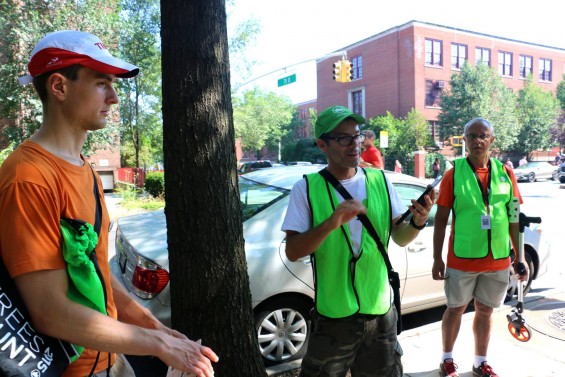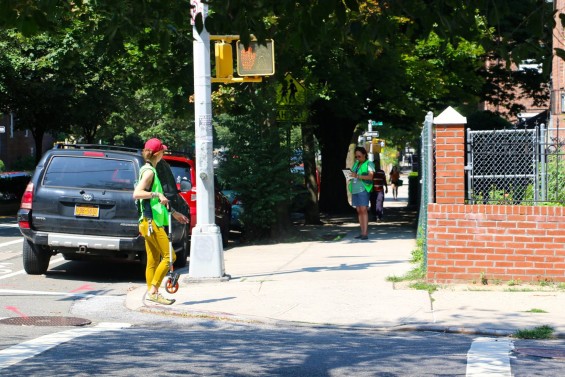
JHBG (source: Facebook)
July 21, 2015 By Michael Florio
The Jackson Heights Beautification Group is assisting the Parks Department count and map out all the trees in the neighborhood.
Every ten years the Parks Department–with the help of neighborhood groups such as the Jackson Heights Beautification Group– counts and maps out all the trees across the city to identify where more trees need to be planted and what trees need to be replaced.
The JHBG started the process of going block-by-block earlier this month and is documenting where the existing trees are located and how far each tree is from one another, according to Len Maniace, President of the JHBG.
The group is also using a measuring tape to determine the circumference of each tree and is also identifying the kind of trees. The results are then entered into an app.
 The group also marks down what trees are dead (or where there are stumps) and need to be replaced.
The group also marks down what trees are dead (or where there are stumps) and need to be replaced.
“We mark this all on the app for each block and the city knows what blocks need more trees,” Maniace said.
The Parks Depart. is doing this city wide, and has already counted more than 80,000 trees in just 13 percent of the blocks in all five boroughs.
Queens has had the smallest percentage of blocks counted so far, with only 9 percent of blocks covered. Manhattan has the most at 33 percent, according to the Parks Dept.
Maniace said that tree counting is enjoyable work.
“You get to learn and participate in this citywide science project, while also giving back to the community,” he said. “It may seem nerdy, but it is really cool.”
In total, the JHBG will count trees on roughly 110 blocks. The group started tree counting earlier this month, and has hosted three tree-counting events already.
There are two more countings planned, one this Wednesday from 6pm to 8:30 pm and another this Sunday from 9 am to noon. However, Maniace said they will need to plan more for August to complete the neighborhood.
So far he said the group has counted about 25 blocks. He is hopeful that they can bring that number to about 55 after the next two scheduled counting sessions.
Maniace said that it is important to complete the task since it could lead to more trees being planted in the neighborhood.
One section of the neighborhood where he believes there is a need for more trees is between 70th and 79th Street, between 34th and 35th Ave.
“Some blocks only had four or five trees,” he said. “I think they should have 14 or 15.”
Maniace said that the trees are important because they provide shade, which offers a break from the heat in the summer.
“To me it felt 10 to 15 degrees cooler under a tree,” he said. “Walking down a block with less trees I could definitely feel the difference.”
“They also help clean the air and can help soak up the water when it rains,” he added.
The JHBG has received help from the community, with 15 to 20 people showing up to each of the first three counting sessions, Maniace said.
However, he added that anyone who is interested in volunteering would have to take a training session first, which is no longer being offered in Jackson Heights.
He said those interested would have to reach out to the Parks Depart. and see when other neighborhoods are holding their training sessions.

JHBG (Facebook)
